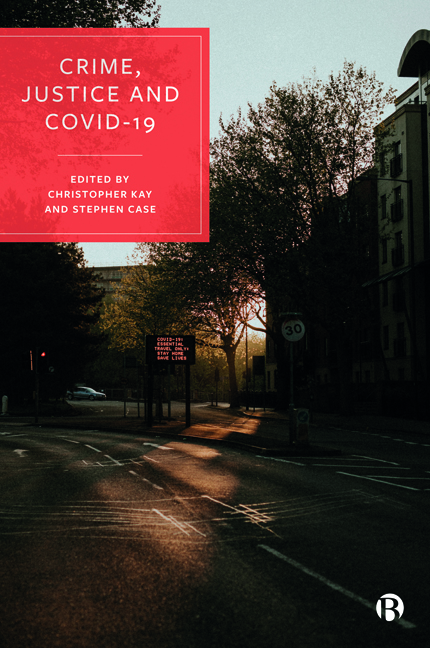1 - Introduction: Understanding and Responding to Pandemics in Criminal Justice
Published online by Cambridge University Press: 20 January 2024
Summary
On 31 December 2019, an outbreak of an unknown respiratory disease, later known to be coronavirus disease 19 (COVID-19), caused by severe acute respiratory syndrome coronavirus 2 (SARS-CoV-2) was reported in Wuhan, China. The disease rapidly spread through China and, eventually, the rest of the world, resulting in the World Health Organization (WHO) characterizing COVID-19 as a pandemic on 11 March 2020 (WHO, 2020a). At the time of writing, some two years after the initial cases of COVID-19 were reported in Wuhan, there have been 526 million reported cases and nearly 6.2 million deaths worldwide.
The disease appears to be transmitted through ‘droplets and fomites during close unprotected contact’ between infected and uninfected individuals (WHO, 2020b: 8). Research shows that the severity of symptoms among COVID-19 patients can be quite broad, ‘encompassing asymptomatic infection, mild upper respiratory tract illness, and severe viral pneumonia with respiratory failure’ which can prove fatal (Zhou et al, 2020: 1054). Research also shows that severity of disease is dependent on such things as the presence of pre-existing health conditions (Guan et al, 2020) and patient age (Coker, 2020) as well as location and intensity of transmission (WHO, 2020b).
The first cases of COVID-19 in the United Kingdom (UK) were reported on 29 January 2020. In March 2020, in response to the threat posed by the virus, the UK government introduced a range of measures to reduce incidents of community transmission. Central to these recommendations were the implementation of stringent social distancing measures (involving the closure of schools, recommendations to avoid nonessential travel and the suspension of all public events) along with recommendations for anyone with at least one of two common symptoms of COVID-19 (a persistent cough or a fever) to self-isolate for a minimum of seven days. Self-isolation was also recommended for those most at risk of developing severe disease.
While life as most of us knew it paused, or even ground to a halt, for a range of public services it became more a case of business as unusual, and the criminal justice system in England and Wales was no exception. ‘Crimes continued to be committed, reported and investigated; cases were charged and progressed; detainees remained in the adult and youth secure estates; and those under the care of youth offending and probation services remained so’ (Criminal Justice Joint Inspection, 2021: 5).
- Type
- Chapter
- Information
- Crime, Justice and COVID-19 , pp. 1 - 8Publisher: Bristol University PressPrint publication year: 2023



